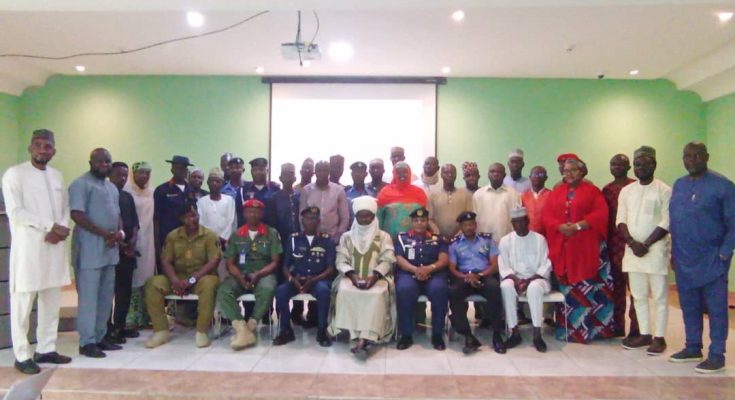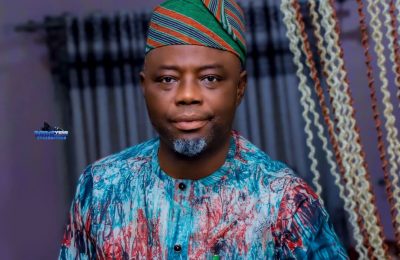

It has been lamented that though so many Journalists and other Media practitioners have become victims of conflict, terrorism and violent extremism, the Media still has a role to play in countering violent extremism.
It was also stressed that the role of the media as the Fourth Estate of the realm in every society cannot be overemphasised as it is the web that binds society together, can either make of destroy a society through its reportage.

The assertion was made by a University Lecturer with the Nigerian Defence Academy (NDA), Kaduna, Adejoh Sunday, PhD while presenting a paper titled: ‘Understanding Media Accountability and its role in Reducing Violent Extremism in North-East, Nigeria’ at a 2-day Sensitisation workshop for Accountability Media on deescalating violent extremism and terrorism financing through conflict sensitive reporting in the North East.
He stated that Violent Extremism “generally refers to acts of violence that are justified by or associated with an extremist religious, social, or political ideology.
The Don also stated that the concept of violent extremism is broader and more expansive than terrorism, because it accommodates any kind of violence, as long as its motivation is deemed extremist.
Violent extremism (VE) – activities include beliefs, attitudes, actions, strategies of people who support or use violence for political, religious or other identity-driven beliefs.
This includes terrorism and other forms of identity-motivated violence from hate crime to genocide.
He however stated that Content monitoring plays an important role when considering the role and the place of media accountability systems (MAS) in the wider relationship between media freedom and médiá responsibility in democratic society.
According to him “In my view, “media accountability” must be considered as important nowadays as press freedom and State regulation of media, both of which are indispensable, but both of which can be dangerous and neither of which is capable of producing quality news media.”
He also stated that a confIict sensitive Journalist takes no sides, but is engaged in the search for solutions. Conflict sensitive journalists choose their words carefully.
“As Journalists, our most powerful tools are the words we use. And the pictures and sounds. We can use our tools to build understanding instead of fears and myths. The more Journalists understand about confIict, the better equipped they will be to on events and processes in ways that likelihood of parties achieving peaceful solutions,” Adejoh Sunday stressed.
On Media Accountability and Counter-Violent Extremism(CVE) he stressed that prevevtion/Counter-Violent Extremism communications interventions usually attempt to confront or to persuade, to delegitimise the content and appeal of violent extremist propaganda (when it is often called ‘counternarrative’ or ‘counter-speech).
He added that by strengthening resilience Journalists and media, programmes can enhance understanding of P/CVE and encourage inclusive, impartial reporting.
The University Don added that strategic communication and content moderation are at the center of both of these policy responses which are a calculation about how best to limit audience exposure to extremist narratives and maintain the marginality of extremist views, while being conscious of rights to free expression and the appropriateness of restrictions on speech.
Speaking on the Media in Counter-Violent Extremism he suggested Promotion of Positive Narratives: Highlight stories of resilience, tolerance, and peaceful coexistence within communities affected by extremism.
It can also be done by showcasing positive role models and success stories, media can offer alternative narratives to counter extremist ideologies.
The Journalists and the Media are to provide accurate Information: Ensure that reporting on violent incidents is factual and avoids sensationalism while misinformation and sensationalized reporting can inadvertently amplify the message of extremist groups.
Adejoh Sunday also stressed the engagement of Communities by working closely with local communities to understand their concerns and perspectives.
The Media should also provide platforms for community voices, facilitating dialogue and promoting understanding across diverse groups.
Another thing is to educate against extremism by developing content that educates the public about the tactics and ideologies of extremist groups which could include documentaries, interviews with experts, and analysis pieces that delve into the roots of extremism.
The Media in Counter-Violent Extremism should empower Civil Societies by supporting grassroots organizations and initiatives that promote peacebuilding and counter extremism efforts. Use media platforms to amplify their messages and reach a broader audience.
The Journalists and Media should Challenge Hate Speech by Monitoring and responding to hate speech and extremist propaganda online and offline by playing a role in promoting respectful discourse and countering divisive rhetoric.
He added that there should be use of Social Media Responsibly by utilising social media platforms responsibly to disseminate accurate information and counter extremist narratives as well as engage actively with audiences to promote critical thinking and resilience
Adejoh Sunday said that Journalists and Content Creators should be trained on reporting responsibly on extremism and sensitive issues including understanding the psychological impacts of media coverage and ethical considerations.
According to him, Conflict sensitivity means understanding the context in
operating and understanding the interaction between the context, and taking action to avoid negative impacts of conflict.
According to him, Conflict sensitivity is also acting with the understanding that situations report conducted in a confliict-affected environment will douse the tension and negative impacts knowing that such interaction will have consequences positive or negative effects.
It is also a deliberate and systematic approach to ensuring that there is a minimised negative effects (risks) and maximise positive impacts through actions and opportunities.
The Don stressed that in order to be conflict sensitive, Journalists need to Understand the context; Understand the interaction between their engagement and reports and act upon this understanding in order to avoid negative impacts.
He stressed that Journalists should avoid reporting a conflict as consisting of two opposing sides, avoid defining the conflict by always quoting the leaders who make familiar demands, avoid only reporting what divides the sides in conflict as well as avoid always focusing on the suffering and fear of only one side.








